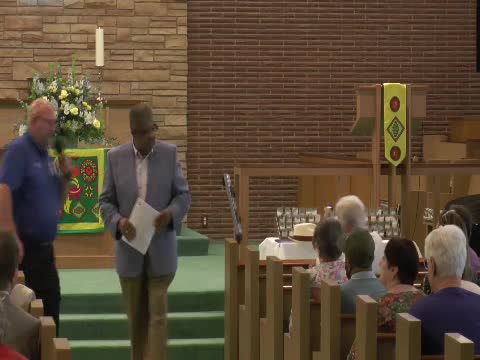Jacksonville code enforcement explains complaint process, fines and common violations at District 1 town hall
Get AI-powered insights, summaries, and transcripts
Subscribe
Summary
At a District 1 town hall, city code enforcement supervisor Robert Ptachka reviewed how residents should report property violations, described common citations in the Arlington area and detailed penalties for illegal signs and junk vehicles.
At a District 1 town hall in Jacksonville, Robert Ptachka, supervisor for the Greater Arlington area code enforcement unit, outlined how residents should report property complaints and summarized the most frequent citations his officers issue.
Ptachka said anonymous complaints are no longer accepted after a change in state procedure and advised residents to use the MyJax app or to phone the city’s intake line ("call 630," as he put it) so the address is entered correctly. He said the office has authority over civil, property-related violations — such as junk vehicles, trash and debris, commercial-vehicle parking on private property and most sign violations — while solid waste handles trash-container issues in areas outside downtown Jacksonville.
The details matter for residents who want enforcement: Ptachka said the city now requires a complainant’s name and address under what he identified as "state bill 60," and that when a property is cited the department typically advises those asking about complainant identity to file a public-records request rather than releasing the complainant’s information.
Why it matters: changes to complaint procedures and the distribution of enforcement responsibilities affect whether and how quickly problems such as blight and illegal signage are addressed.
Ptachka described several common enforcement outcomes in Arlington. He said his unit currently has five officers with a sixth arriving in roughly three weeks, and that one officer will be unavailable for about a year beginning in January because of military orders. Officers can issue citations for vehicles missing current registration or a properly displayed tag, and for vehicles they deem inoperable (for example, "missing the front end"). Inoperable vehicles, he said, typically receive a 15-day notice to remove or repair the vehicle.
On signage, Ptachka said his office has pursued owners of widespread “We Buy Junk Cars” signs and a yard‑sign printer. He said one owner received roughly $21,000 in citations that were later settled for $10,000, payable in a set monthly amount; he said another printing business was issued about $6,000 in citations. He explained the city’s fines for small, right‑of‑way signs (often called "snipe signs"): an initial fine of $55 for the first five removed on the same day, $150 for the sixth sign and above, and $355 if a sign is attached higher than five feet on a pole.
Ptachka addressed backyard fowl: in much of the Arlington area residents may keep up to five hens but roosters are prohibited except in agricultural zones. He also said some parts of the neighborhood are designated by a "chicken overlay" where chickens are not allowed even with a permit.
Enforcement limits and evidence: Ptachka described the practical challenges his officers face in proving violations, such as citations for roosters or for animals located behind fences. He said officers can cite from public vantage points, can accept access from a neighbor to view a vehicle, and can cite if a license plate is visible from the public right of way. He noted that front license plates would simplify enforcement but said that is a state decision.
Residents asked procedural questions during the session. The council member hosting the town hall told attendees the council office will accept complaint information and submit it on residents’ behalf if they prefer to avoid filing publicly.
The presentation closed with a reminder that code enforcement staff also run special projects when fully staffed — neighborhood sweeps that inspect every property — and that citizens can call the city to reach an officer of the day for additional questions.
